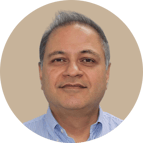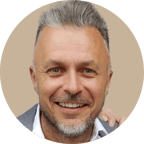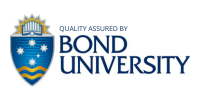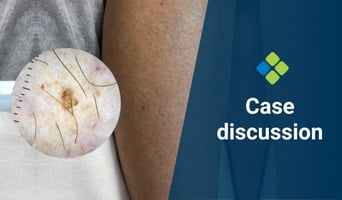In this webinar and Q&A, solicitor and former regulator David Gardner provides exclusive insights...

Gain the skills to diagnose and manage patients with musculoskeletal conditions and sports injuries in primary care.

Learn to diagnose and manage patients with musculoskeletal conditions and sporting injuries in primary care, with a focus on sport nutrition, drugs in sport, exercise, physical activity in children, and more.
- Acquire expert-level knowledge in musculoskeletal and sports medicine, including issues such as drug use, nutrition, the role of a team doctor, and more.
- As musculoskeletal conditions account for over 14 per cent of general practice encounters, this online course will enable you to better meet patient demand and improve outcomes.
- This course is for medical doctors and degree-qualified medical practitioners.
- CPD-accredited and university-assured.
- Become a trusted source of support for your physically active patients, from weekend sportspeople to high performance athletes and even children.
- Provide comprehensive advice to your patients regarding sport nutrition, drug use, and exercise as medicine.
- Provide your patients with immediate care by addressing common ailments in general practice, and provide long-term support for those with ongoing joint and musculoskeletal pains and sporting injuries.
- Judge when to refer on a patient, and learn how to work collaboratively with specialists and physiotherapists.
Get unlimited access to all course content, additional learning materials, ongoing post-course support, and more.
Arthritis is an umbrella term for over 100 diseases and conditions affecting the bones, muscles and joints. More than 30 of these are inflammatory rheumatic diseases. The steps of early assessment and diagnosis are outlined commencing with symptoms, patient history and test options. This information is supported by two clinical cases. The first case considers septic arthritis and the second case discusses polymyalgia rheumatica. Inflammatory arthritis aetiologies are outlined before discussing gout and pseudogout in detail.
The module then considers rheumatoid arthritis covering the facts, aetology, history, stages, tests, clinical features and extra-articular manifestations. A case study is included. Pharmacotherapy, DMARDS, non-pharmacological options and complications are outlined. Information is provided on Rheumatoid arthritis (RA) and pregnancy, and RA and vaccination.
Unit five discusses ankylosing spondylitis and psoriatic arthritis in detail including aetiology, symptoms, investigations, tests to assist with diagnosis, differential diagnoses and management information.
The aim of this module is to consider patients who have symptoms where it is difficult to make a firm diagnosis, but who still need care, support and in some instances, symptomatic treatment. Content commences with the challenges facing a practitioner when dealing with these patients. These patient presentations are common and symptoms are variable. Information is provided in how to manage these patients including cultural factors, common symptoms, syndromes, the patient perspective and diagnoses. Information on electromagnetic hypersensitivity is detailed.
A patient-centred approach aims to combine evidence based diagnosis and treatment with what patients experience. Six components of patient centred care are outlined. Treatment should aim to establish an effective physician-patient relationship, help develop strategies for coping and encourage patients to lead a normal work/social life. History, examinations, investigations and self help strategies are discussed. Unit five discusses three patient cases.
If you're not interested in pursuing a full certificate in this field but simply want to enhance your skills in specific topics covered in this course, you can access the content of this and other courses for a flat fee of $83 per month (paid annually) within HealthCert 365.

General practitioner
A native Queenslander, Dr Huddy Fuller graduated from the University of Tasmania in 2012, and spent his hospital years in Launceston then Hervey Bay. He went on to complete GP Fellowship in NSW, choosing general practice because he believes it is the most important medical speciality for the betterment of people’s lives.
Dr Fuller has a background as an exercise physiologist and enjoys bringing this knowledge to general practice. He is experienced in skin cancer screening and management, musculoskeletal medicine, and chronic disease management especially type 2 diabetes. Dr Fuller focuses on an education and shared decision making approach to general practice.
He is heavily involved in the team sport Ultimate Frisbee.

General practitioner
Dr Anoop Jalota is a general practitioner who has special interests in emergency procedures and musculoskeletal medicine. He is passionate about helping patients to quit smoking and manage their weight. Dr Jalota is currently a cluster leader for Central Illawarra and has a passion for continued learning and mentoring.
.png?width=143&height=143&name=Joe%20Kosterich%20(3).png)
Doctor, speaker, author, media presenter and health industry consultant
Dr Joe Kosterich is a doctor, speaker, author, media presenter and health industry consultant. Wanting you to be healthy and get the most out of life, Dr Kosterich writes for numerous medical and mainstream publications and is a regular on radio and television. He is often called to give opinions in medico legal cases, is clinical editor of Medical Forum Magazine, adjunct professor (teaching) at UWA and a lecturer at Curtin Medical School. Medical Advisor to Medicinal Cannabis company Little Green Pharma and Chairman of Australian Tobacco Harm Reduction Association, Dr Kosterich has self-published two books: Dr Joe’s DIY Health and 60 Minutes To Better Health, and maintains a website and blog with health information and commentary. Previously he held senior positions in the Australian Medical Association and sat on numerous industry and government boards. He has extensive corporate experience in the setting up and management of medical centres and in helping businesses maintain a healthy workforce. Through all this he continues to see patients as a GP each week.


Senior Lecturer, Exercise Physiology, School of Sport and Health Sciences, Cardiff Metropolitan University, Wales
Dr David Pugh is a Senior Lecturer in Exercise Physiology within the School of Sport and Health Sciences at Cardiff Metropolitan University, Wales. His global research agenda focuses on how regular exercise and physical activity can effectively prevent and treat cardiovascular and metabolic diseases across the lifespan.

Podiatrist & physiotherapist
Ronnie Bateman attained his professional qualifications from LaTrobe University, Melbourne. In 1995, he graduated with a Bachelor of Physiotherapy and returned to study a Bachelor of Podiatry and a Masters of Musculoskeletal Physiotherapy.
Mr Bateman has worked in several sectors including elite sport, aged care and disability, occupational, public health, and private practice.
As a clinician, he promotes treatment pragmatism, and concedes that there are exceptions to most supported clinical and research-based beliefs.
As a podiatrist, he enjoys the challenge of complex foot/ankle conditions, in addition to assisting more proximal pathologies (such as knee pain) by altering distal biomechanics. Podiatric interventions he adopts can include one or more of the following: shoe alterations, insole alterations, over-the-counter orthotics, hand-made insoles/orthotics, strapping, padding, and off-loading. He continues to make devices from casting to fitting where necessary.
As a physiotherapist, Mr Bateman will consider evidence-based research and “old-school” manual therapy options in an attempt to make maximum improvement in the shortest timeframe.
As a lower-limb musculoskeletal practitioner, he can apply top-down (physiotherapy based) and bottom-up (podiatry based) approaches.
Principles and philosophies supported include:

Study at your own pace and to your own schedule. Interactivity, discussion, and feedback opportunities are included.

Easily meet your CPD requirements and gain valuable skills – all in one place for $83 per month.
$1595
.
Bundle two courses and save 5%, or three courses and save 10% upon enrolment.
Talk to us about deferred payment options, registrar scholarships and special rates.
.jpg?width=680&height=500&name=PDMSM%20(1).jpg)

HealthCert courses have become the standard by which you gauge all others.
Dr K. Abolarinwa
Good, courses with excellent speakers. I particularly enjoyed the case study scenarios which helped to integrate the knowledge gained.
Dr A. Tucker
This is the pathway to improve your confidence and evolve into the GP you aspire to be.
Dr S. Shinwari
| RACGP Activity Number | ACRRM Activity Number | Activity Title | Education Hours | Performance Hours | Outcome Hours | ||
|---|---|---|---|---|---|---|---|
| 788339 | 32771 | Inflammatory arthritis | 788339 | 32771 | 5.5 | 6 | 0 |
| 788419 | 32772 | Unexplained symptoms: Symptoms with no firm diagnosis | 788419 | 32772 | 5 | 6 | 0 |
| 788436 | 32773 | Nutrition for sport and musculoskeletal health | 788436 | 32773 | 4.5 | 6 | 0 |
| 788455 | 32774 | Children's health: Sport and exercise | 788455 | 32774 | 5 | 6 | 0 |
| 788466 | 32775 | GP cases: Managing the weekend sportsperson | 788466 | 32775 | 4.5 | 6 | 0 |
| 788470 | 32776 | The role of Sports Team Doctor | 788470 | 32776 | 4.5 | 6 | 0 |
| 788480 | 32777 | Performance athletes and medicine | 788480 | 32777 | 4.5 | 6 | 0 |
| 788486 | 32778 | Legal and illegal drugs in sport | 788486 | 32778 | 4.5 | 6 | 0 |
| 763902 | 32398 | Clinical Audit of Musculoskeletal and Sports Medicine: Arthritis | 763902 | 32398 | 0 | 2 | 19.5 |
| 763923 | 32399 | Clinical Audit of Musculoskeletal and Sports Medicine: Sports Injuries | 763923 | 32399 | 0 | 2 | 19.5 |
| 766233 | 32437 | Professional Knowledge, Skills and Networking | 766233 | 32437 | 6 | 0 | 0 |
| Total hours | 44 | 52 | 39 | ||||
View the CPD Hours for all HealthCert Education activities.
| RACGP Activity Number | ACRRM Activity Number | Activity Title | Education Hours | Performance Hours | Outcome Hours | ||
|---|---|---|---|---|---|---|---|
| 448427 | 31143 | Rheumatoid arthritis | 448427 | 31143 | 4 | 6 | 0 |
| 448705 | 31147 | Degenerative joint diseases | 448705 | 31147 | 4.5 | 6 | 0 |
| 448438 | 31144 | Neck injuries in sport | 448438 | 31144 | 3.5 | 6 | 0 |
| 448711 | 31150 | Low back pain | 448711 | 31150 | 4 | 6 | 0 |
| 448717 | 31152 | Recurrent musculoskeletal and sports injuries in men | 448717 | 31152 | 5 | 6 | 0 |
| 448689 | 31145 | GP Cases- Acute musculoskeletal and sports | 448689 | 31145 | 5 | 6 | 0 |
| 448419 | 31142 | Musculoskeletal Pain | 448419 | 31142 | 4.5 | 6 | 0 |
| 448692 | 31146 | Physical and Biomechanical assessment of lower limb and gait problems | 448692 | 31146 | 7 | 6 | 0 |
| 802660 | 32987 | Low back pain Outcome Improvement Activity | 802660 | 32987 | 0 | 0 | 8.5 |
| Total hours | 37.5 | 48 | 8.5 | ||||
HealthCert provides several options to complete your measuring outcome hours. These options are self-recorded activities and hours taken may vary depending on your focus area.
The Professional Diploma of Musculoskeletal & Sports Medicine is for degree-qualified medical professionals who wish to learn how to improve patient outcomes, especially those patients with musculoskeletal conditions commonly seen in general practice.
This course is for physicians and degree-qualified medical professionals. Participants must have successfully completed the HealthCert Advanced Certificate of Musculoskeletal & Sports Medicine (or a qualification deemed equivalent).
Participants do not have to pass an IELTS test but, as the courses are delivered in English, proficiency in listening, reading and writing English is assumed.
Participants will require access to a computer/laptop, an internet connection and a basic level of technology proficiency to access and navigate the online learning portal.
Professionally recognised qualifications and prior studies may be recognised for entry into this course if the learning outcomes match exactly. Please ask a HealthCert Education Advisor for an individual assessment of your prior qualifications and experience.
This certificate course meets the minimum 50 hours CPD annual requirement across all three mandatory CPD activity types.
Upon successful completion of the course requirements, participants will receive the Professional Diploma of Musculoskeletal & Sports Medicine and CPD hours.
This certificate course:
To learn more about the delivery of certificates in Australia and overseas, please visit our FAQs.
Professional Diploma Pathway
This course is the final stage of the three-part professional diploma pathway. The full pathway is Professional Certificate of Musculoskeletal & Sports Medicine, Advanced Certificate of Musculoskeletal & Sports Medicine, and Professional Diploma of Musculoskeletal & Sports Medicine.
Postgraduate Pathway
Graduates of the HealthCert Professional Diploma of Musculoskeletal & Sports Medicine qualify for a scholarship into the Master of Science: Sports & Exercise Medicine, or the Master of Science: Rheumatology. These are online courses from the UK designed for medical practitioners. Please contact our UK partner directly regarding these scholarships: https://www.diploma-msc.com/s/healthcert
This organisation is an RACGP-accredited CPD provider under the RACGP CPD Program.



Don't see your question? Explore other faqs or talk to us.
Fees will vary based on the program and study option selected (fully online vs online + optional practical workshop). Payments can be made upfront or in monthly instalments. Special rates and various payment options are available. GP registrars and doctors in training enjoy a scholarship of up to $500. Talk to us to learn more.
Completion of any HealthCert course or attendance at an event will enable you to access the HealthCert Alumni Program which includes:
HealthCert Education is pleased to issue digital credentials for alumni. Digital credentials are a permanent online record of your successful completion of a HealthCert course and are issued to all course participants in addition to PDF certificates. If you are based in Australia, you also have the option to order a hard copy of your digital certificate for a small additional fee.
The recommended study duration of this certificate course is 107.5 hours, which includes study of the pre-course activities and readings, online lectures, live tutorials, and online assessment. This self-paced course offers the flexibility of 100% online study in your own time, at your own pace, in your own home or office, with no mandatory face-to-face requirements. You are not required to be online at specific times but can view and replay video lectures at your convenience.
All HealthCert courses meet World Federation of Medical Education standards. This certificate course qualifies for CPD hours from the Royal Australian College of General Practitioners (RACGP) and the Australian College of Rural and Remote Medicine (ACRRM) in Australia. It is recognised by the Royal New Zealand College of General Practitioners (RNZCGP) in New Zealand. It is recognised by the Hong Kong College of Family Physicians (HKCFP) in China. It is a self-submitted activity in Dubai and the United Kingdom. It is a self-submitted activity through the College of Family Physicians in Canada. If you live or work outside one of the above-mentioned countries, please contact us on admin@healthcert.com to discuss whether this course can be recognised in your country.

In this webinar and Q&A, solicitor and former regulator David Gardner provides exclusive insights...

This week's case discussion, submitted by Dr Heather Lawson, features a 64-year-old female patient...

Mood changes in the postpartum period are extremely common, ranging from mild and transient “baby...
Want to stay up-to-date with the latest case studies, podcasts, free video tutorials and medical research articles pertinent to primary care?
Our Education Advisors can assist you with any queries and tailor our education pathway to suit your current expertise, interests and career goals.